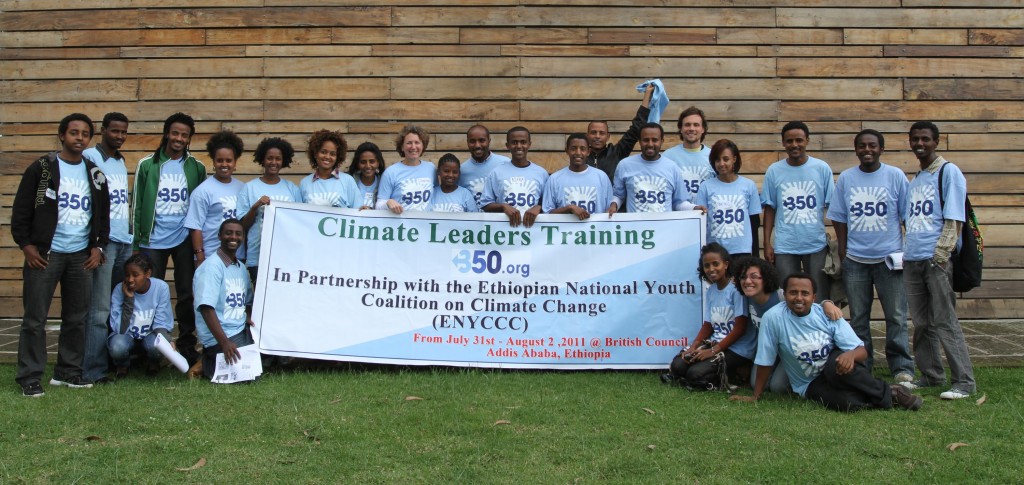On July 31st 2011, I arrived in the rain-soaked Addis Ababa, Ethiopia to help facilitate a 3-day climate leadership workshop. Samantha, the 350 Africa coordinator, and I worked with the newly established Ethiopian National Youth Coalition for Climate Change (ENYCCC) to run this workshop for 30 youth on the premises of the British Council.
For 3 days, students, young professionals, community organizers and famous Ethiopian singer, Michael Belayneh, came together to network, learn about the current reality of climate change, map out local impacts and concerns, and become part of the global climate movement. Ethiopian youth are no strangers to climate activism. In fact, the team behind the ENYCCC managed to organize probably the largest 350 demonstration to date — 15,000 school children in streets of Addis Ababa back in 2009 — and they have been actively organizing ever since.
It was shocking to realize that while it was constantly raining on Addis Ababa for the duration of my visit, drought and famine were killing thousands of people and putting millions at risk of starvation in the eastern portion of Ethiopia and in Somalia, Kenya and Djibouti. To me, this was a constant and sobering reminder of how fragile human life is and how much more frequently extreme weather was going to devastate African communities if we didn’t stabilize our climate, and get back to 350 ppm.
Being an Egyptian, it was inevitable that the topic of the Ethiopian Grand Millennium dam project would come up. As much as there is positive government hype about it in Ethiopia, the opposite is true for Egypt — people here are scared of the dam and the possible impacts it would have on Egypt’s share of Nile water. According to several studies the dam is not likely to affect Egypt negatively, but the fear is still there.
My new Ethiopian friends were open to discussions about the dam and were genuinely concerned about the effect it would have on Egypt. It was through this discussion that I came to realize our common fate and the very real threat that climate change might pose to both our countries’ water resources, ![]() if reduced rain patterns affected the flow of the Nile.
if reduced rain patterns affected the flow of the Nile.
What I learned from my Ethiopian friends is that now, more than ever, there is a real need for collaboration between all of us in the African continent, just as it makes sense for the world to unite in tackling the climate crisis. Livelihoods – and lives – are at stake and it is through collaboration that we can hope to both overcome our local issues, and the global climate crisis.
During the workshop, there was a particular group game where participants got in a circle, stretched both their hands towards the middle and grabbed random hands of other people, which caused them to get “tangled-up.” Their task as a group was to untangle themselves without letting go of each other’s hands. This image was a very striking metaphor for the state of our world, as pointed out by one workshop participant. Though the climate crisis affects each of us in a different way, it inextricably ties us all in one huge knot. It is through coordinated and unified global effort that we can all get untangled.

